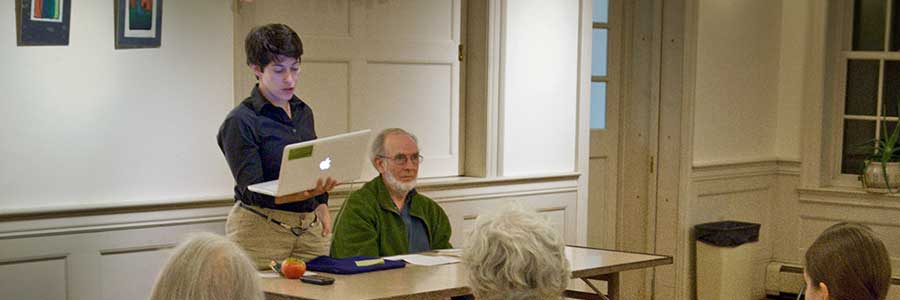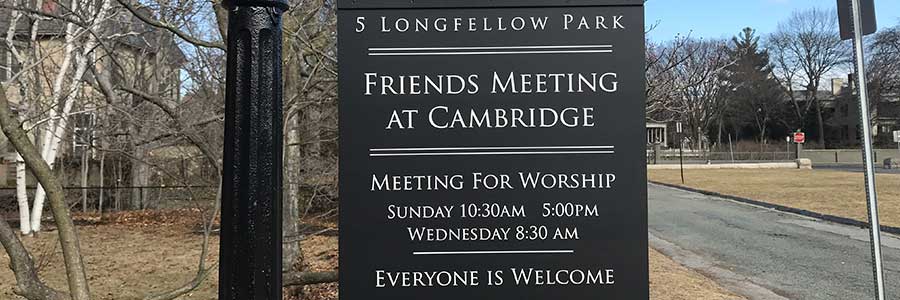“I have no full definition to give of the word ‘Spiritual’ — which ranks high among the elusive words of the language… I hope myself that it will always escape capture and definition; we want some human-divine words, which belong both to earth and heaven; with meanings rooted in experience, but springing up into the regions where we walk by faith rather than by sight.”
—William Charles Braithwaite (1862-1922)
Christian faith and practice in the experience of the Society of Friends
London Yearly Meeting of the Religious Society of Friends, 1960. P 88.
Minutes and Reports for March 12, 2023
Minutes and Reports for February 12, 2023
Minutes and Reports for January 8, 2023
Minutes and Reports for December 11, 2022
Minutes and Reports for November 13, 2022
For a list of past Minutes and Reports, please visit the FMC Community website.

As stated in the book of Faith and Practice of New England Yearly Meeting of Friends (1985, p. 244) at the end of each calendar year, Ministry and Counsel of New England Yearly Meeting (NEYM) asks monthly (local) meetings to prepare a State of Society Report. The report should be a searching self-examination by the meeting and its members of their spiritual strengths and weaknesses and of the efforts made to foster growth in the spiritual life. Reports may cover the full range of interest and concerns but should emphasize those indicative of the spiritual health of the meeting.
2023 State of Society Report
2022 State of Society Report
2021 State of Society Report
2020 State of Society Report
2019 State of Society Report
2018 State of society Report
2017 State of Society Report
2016 State of Society Report
2015 State of Society Report
2014 State of Society Report

“One vessel, but many lives / swirling around the boiled pot / ‘til they are poured / into our separate entities, / four cups reaching out / to accept their living grace.”
—Brianna Richardson, North Pacific Yearly Meeting
(from “Spirit Rising: Young Quaker Voices”, Quaker Press 2010)
An Epistle to the Meeting from the FMC Meeting on Ministry and Counsel, May 16, 2010
The following letter was written to summarize some challenges we face as a theologically diverse religious community, and how we have tried to deal with them.
Dear Friends:
The past several years have been difficult ones for our community. In our Meetings for Business in Worship, we have struggled with conflicts between concerns for safety and conscience, financial stresses, staffing for our Meeting, and balancing the views of society with our own leadings. Deep wounds have been caused to members of our community, and some long-time members have left.
In recent years some members of our community have articulated a sense that our worship during business meetings has not been deep enough to sustain us, and that our deliberations and decisions are often not coming from a Spirit-led place. Underlying these worries and sense of disconnectedness has been an undercurrent of concern, suspicion, and even resentment that we are not all unified by a common assumption of the central importance of the Divine, and its place at the center of our Meeting and our decision-making. Certainly, Friends before us have known difficult times and have met them in the strength of a gathered community.
It is not easy to name the experiences that bring us to Meeting and arise out of worship. Yet, we wish to be part of that venerable tradition of speaking of that which is beyond names but about which we long to speak. Because of our diverse theological backgrounds, we may use very different language to express our experience of Meeting for Worship and the Light Within. Those who use the word God may know it as the name for a life-giving or saving reality they have experienced. Others choose not to use that word because they are aware that it may be used to refer to an objectified, reified being, and often results in inadequate and narrow meanings. Still other Friends may not conceive of God as a “being,” but still reject the negation implicit in the term Non-Theist. Some Friends have silenced themselves, simply not wishing to offend others by the names they use for the Divine.
Although we treasure our diversity, we may be dismayed if we do not hear the traditional Quaker language that nourishes our spirit in Meeting, or we may hear language that we struggle against in the very place where we come for nurture and support. These differences have sometimes led to the all-too-human tendency to create the “other” when we feel that our own identity is challenged or neglected. Our ability to communicate tenderly with each other is truly compromised when we label and categorize others. Our individual and collective responsibility is to seek the Divine within each other as brothers and sisters in the Religious Society of Friends, regardless of how we may each choose to name that experience.
There are many ways in which the Meeting community has sought to open channels of communication so that we can listen beyond the words to the meaning and Light that each of us brings to Meeting. Ministry and Counsel believes that the Meeting has been and will continue to be enriched by our search for a foundation of unity. Without an assumption of a Generative Ground of Being or Light Within as a basis of our unity, the diversity which we celebrate is at risk of leading to fragmentation and an ungrounded individualism. We believe that our diversity can be enriched by unity or integral wholeness, and that our unity can be enriched by our diversity of knowing and leadings. Quaker tradition has consistently spoken of the Light Within to refer to the vital, living experience of Divine guidance and this tradition has been the basis of Quaker unity.
Over the course of the past year, Ministry and Counsel has sponsored a number of events with the express goal of moving beyond outward words and labels to find the center that unites us, informs us and guides us. Through the three recent retreats we find there has been movement within the Meeting.
The retreats began by providing an opportunity for friends to speak their inner rumblings aloud to the community. We heard the pain of feeling excluded as a Non-Theist, and the pain of feeling one’s religious identity as a Christian maligned in anger by someone who had been hurt by Christianity. We heard bitterness about assumptions that others held about our individual beliefs; frustration with how others define Quakerism. We heard the angst in the question “How can you be a Quaker if you don’t believe in God?’ We heard anger at the role Christianity has played, and is playing, in our culture. We developed an understanding of how these emotions have been repeatedly provoked by “hot button” words.
Through sharing in small groups and large, we began to understand that there are no homogeneous groups of Theists and Non-Theists, Christian and Non-Christian. Instead, there is a spectrum of ever-evolving interpretations of the nature of transcendence and the role of Jesus and his teachings in our lives. We agreed that we could now try to hear each other’s words of faith as individual expressions of Spirituality, and not to cringe with resentment at the language. In vocal ministry we are now hearing freer use of language that reflects the speaker’s own unique experience of Spirit. Some who had been silent are once again using the words that hold meaning for them.
Our attempts to discern whether FMC needed a shared identity, and what that shared identity might be, led to a swirling confluence of ideas about what we shared. No common definition of Quakerism emerged; instead, there was a realization that the very unnamable and experiential mystery of Meeting for Worship holds us together and from this flows the love, community, and service which sustains us.
Even if we cannot specifically name the center of our Meeting, we must nurture it. In these critical times, there is an urgency to make the journey into the Light as individuals and as a Meeting community. The need for witness and action seems unprecedented. We believe that our tradition, with its powerful center, offers unique guidance for meeting the challenges that have arisen and no doubt will arise within our own community in the future. This powerful tradition can also provide the foundation through which we pursue the changes in human consciousness so greatly needed to address ongoing conflict and the despoiling of the earth. We must continue to try to name and affirm those things that unite us. Perhaps it is through our continued commitment to explore the question “how much shared identity do we need?” that we indeed create our shared identity.
May we continue to seek our ground of unity through our Quaker traditions, world spiritual traditions, and new revelations on the nature of the universe. With humility and dedication, perhaps we will find new words and images, or reclaim old images and words, that awaken our hearts to greater connection with each other and Spirit.
We have no prescribed creed. While some of us identify ourselves as Christians, some do not. Some have a strong sense that they are accompanied by the living God, others may understand God as metaphor.
When we share our religious experience, we rely on deep listening to seek below the words for the Spirit that unites us. Our decision-making process has been described as radical democracy. We believe God cherishes every one of us in equal measure, and we therefore strive to have no hierarchy. At FMC we have no clergy: some say we have abolished the laity, that we are all ministers.
We cherish our Christian and Jewish heritages, as well as many other spiritual traditions. At FMC membership is an affirmation that we share a commitment to each other, to our community, to humankind, and to the natural environment. In the world, we actively strive for social justice, non-violence, peace and reconciliation. We try to live in harmony with the natural world, following our testimony of simplicity.
On Quakerism
As Quakers we seek to help create a spirit of love, truth, and beauty in the universe. We do this by practicing an awareness of the Spirit in our lives, and we share it by meeting together for worship as well as acting together in society.
The Religious Society of Friends arose from a 17th century movement in England to create ideals of truth, simplicity and community in religious and daily life. Soon afterwards, Quakers committed themselves to the Peace Testimony, a rejection of participation in any form of war or violence.
Today, Friends are a diverse world-wide community, all striving to live lives consistent with these principles. Membership joins us with the larger Religious Society of Friends through various Friends organizations. Thus, in joining FMC, you also become a member of New England Yearly Meeting (NEYM), which. includes both unprogrammed meetings, like ours, and meetings which have pastors and where worship is more similar to other churches.

